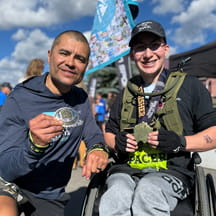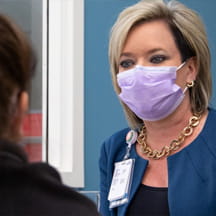Early in his career, Kevin Ahmaad Jenkins, Ph.D., was known for his voice. Jenkins was the first weekend lottery host in North Carolina and worked as the announcer for the Durham Bulls minor league baseball team and teams at North Carolina Central University.
Early on, Jenkins realized he was viewed as a personality—someone whose talent was pumping up the crowd. But Jenkins recognized he needed to use his voice for something bigger. He drew from his mother's battle with kidney disease to formulate his goal to talk about the role of racism in medicine.
He is now a core investigator at the Center for Health and Equity Research and Promotion at the Corporal Crescenz VA Medical Center in Philadelphia. He earned his doctorate in sociology and criminology and law from the University of Florida.
In his Annual Leadership Conference keynote address, Jenkins discussed how “isms,” such as racism or sexism, cause inequity. “Defeating an ‘ism’ means we have to take a stand,” he says. “We have to create a boundary. We have to create a space so it’s understood that it’s not welcome here.”
Through his research, Jenkins developed five guidelines to expand access to health care and bring equity to action.
- Affordability. If you expand access is it more affordable?
- Accessibility. People must get to you. How can you help people through that?
- Availability. Create an expanded list of services that give patients what they need most.
- Accommodation. Do you offer hours that meet community needs? Are you taking steps to create a place people can go to and be trusting?
- Acceptability. Patients and family need to feel that care is acceptable.
Jenkins says bringing equity to an organization may not be a perfect journey—you will make mistakes. “Give yourself some grace,” he says. “You need to invest in patience because the marathon of fairness begins with you.”
Earlier this year, Children’s Hospitals Today spoke with Jenkins. He discussed his research and ideas for organizational change to build inclusion and diversity.
How can the pediatric medical community improve health in minority communities?
We need to understand the social determinants of health. We must think about how you can have a better leverage point with disadvantaged communities. The quickest way to shift a lot of disparities is to improve access. Access is a continuum. Is care affordable? How long does it take me to get there? Is the service acceptable? Unfortunately, so many of our children sitting in a doctor's appointment get attitude from a provider that's meant for a parent.
How are you moving the research forward?
In my forthcoming book, "Hue Process: The Quantitative Measurement of Racism in Medicine," I intersect the theoretical narrative about race and racism with the statistical narrative.
We just finished what we call the digital anatomy of inclusion through a survey of medical schools. We asked how many diverse pictures do you see on the website? Do you see an inclusion or diversity statement? How many clicks does it take to get to a mention of diversity? We were surprised to find, on average, it took about three clicks to find a mention of inclusion or diversity. When we look at our hospital structures, they are really no different.
What are the biological predicates to racism?
If you experience racism and it's unmitigated, it causes sympathetic activity. In some cases, a psychosocial threat can cause over-activity, and if you're already sick your body can't handle certain things. You unfortunately can't tell Black people, "Take care of yourself and don't get stressed out." I tell hospital administrators to create structures within the organization to teach healthy coping-to teach how to deal with stress through mindfulness.
What are your suggestions for building a good community relationship?
Hospital administrators need to think about what they can do at little or no cost to increase the organization's presence in the community. If I only see the hospital when I'm sick, I'm more than likely not going to look at the hospital the same. We need to reengineer that relationship. With a small investment people in a community can know that you care.


